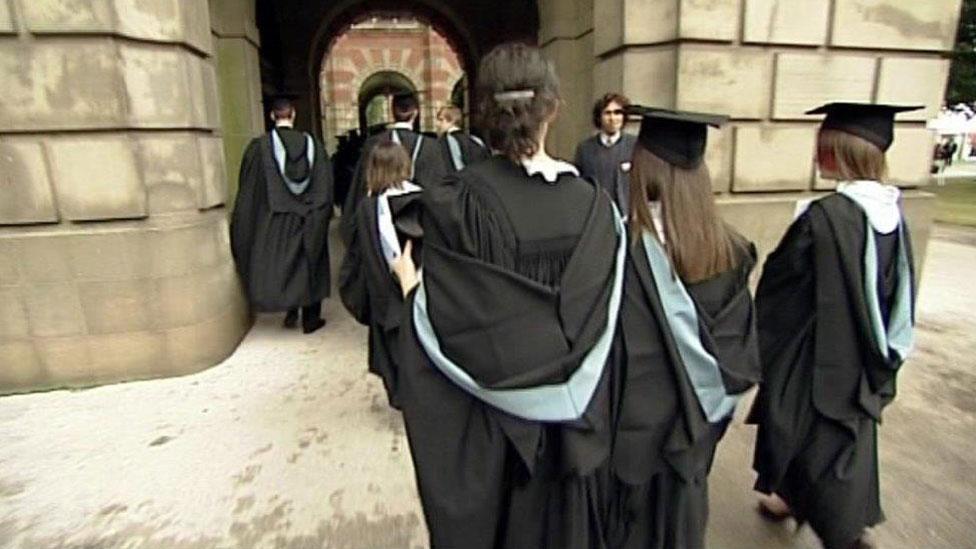Kirsty Williams backs Diamond student finance shake-up
- Published
Kirsty Williams says it will be the most generous student finance system in the UK
The biggest change to student finance in Wales in a generation has been unveiled by the education secretary.
All students will get £1,000 a year before a means-tested grant to help with living costs.
But it will be less generous to those from better off families than a threshold suggested by an independent review.
Students from households earning more than £59,200 now - not £80,000 - will only be eligible for the basic £1,000.
The tuition fee grant of £5,100 will be scrapped and replaced with a maintenance grant of just over £8,000 for students from the most disadvantaged families.
Course fees will be paid back with a loan which students will repay once they have graduated and started earning more than £21,000.
Education Secretary Kirsty Williams was responding to Prof Sir Ian Diamond's recommendations in September, following a three year review.
Ms Williams said the Welsh Government was looking to introduce "the most generous and progressive system anywhere in the UK".
She added: "If you want to go to university, this system will allow you to do so. Academic ability should determine whether you go to university, not your social background."
The changes, which should take place in the academic year 2018-19, mean:
Students from families earning more than £59,200 will only be eligible for the basic £1,000 a year grant and will need to apply for loans to support their living costs. Diamond had recommended that the upper threshold should be £80,000.
A student from a family on average income could receive around £7,000 a year.
The maximum grant and loan for living costs would be just over £9,000. This would cover the term-time living costs of eligible students from the lowest income households, equivalent to the National Living Wage.
Students from families with an income of less than £18,370 would qualify for the maximum grant.
Government sources said around a third of students would be entitled to the full grant and less than a third will get the minimum of £1,000.
About 10% of UK households have an income of over £59,000 but Welsh Government officials were unable to give a figure for the number of households in Wales earning that amount.
But Ms Williams said they had decided to limit the threshold to £59,200 "as we feel it would be sensible and prudent given the current financial outlook for the public sector in Wales".
Officials believe the changes could save at least £40m by the fourth or fifth year of operation, which would then go back into higher and further education.
Ms Williams said: "Our proposals are a fundamental shift so that Wales can develop a higher education funding and student finance system that really does provide for all."
Conservative education spokesman Darren Millar welcomed "the direction of travel" in the announcement but said there would be "an impact on the squeezed middle".
Plaid Cymru education spokesman Llyr Gruffydd welcomed many aspects of the proposals, including the central point that full-time, part-time and post-graduate study would be considered equally and would have access to similar support "that would create a more comprehensible landscape for many people".
The changes come amid concerns the current system is unaffordable.
Universities can charge a maximum of £9,000 for a full-time undergraduate course but, at present, Welsh students only cover the first £3,900.
The rest has been paid for by the taxpayer - at a cost of £237m in 2015-16.
Student Bethan Elin Morgan says it is not easy making ends meet.
Speaking at the time, Prof Diamond said higher education funding needed to be a "partnership between wider society and the individual".
He added: "In contrast to England, where maintenance support for students will be based on loans, we propose a significant universal element of maintenance support for full-time students."
Prof Diamond, vice-chancellor of the University of Aberdeen, said it would mean students from Wales would face a "significantly lower average level of debt on leaving university than those from England."
Figures from the Student Loans Company show that the average loan balance for Welsh students who started repayments in 2015/16 was £16,120 - much lower than the £24,640 for English students.
- Published27 September 2016

- Published15 August 2018
